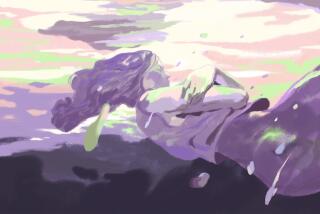Those Stern and Impossible Questions
- Share via
When I was growing up in Denver, that city was situated on the edge of the great prairie that lay to the east, and the prairie spoke to me in the way that Wordsworth claimed the mountains spoke to him as a child. However, the mountains spoke of majesty to Wordsworth, and the prairie spoke to me of escape, because at that time I was captive in the parochial school gulag .
I have no more poignant memory than that of a hot afternoon in the airless eighth-grade classroom where I sat in a sweaty trance, pretending to listen to whatever it was that was going on while I watched the slow passage of shadows across the waxed floor and heard with such anguish a meadowlark call to me, call to me.
I knew where the meadowlark was, though I didn’t dare look. He was on a telephone wire just outside the window, the black V across his yellow chest swelling with song. If I just turned my head toward the window, I would draw the attention of the black-robed teaching nun who would ask me stern and impossible questions: either what had she just been saying, or what did I intend to do with my life--dream it away?
Those are questions that I couldn’t answer to her satisfaction, nor to my own. The prairie held no answer. I was neither hunter, tracker nor amateur ornithologist. When, on a Saturday, I did escape to the prairie, I did little and felt no Wordsworthian outdoor mystique.
I would walk the few blocks of vacant lots on unpaved streets, past cement basements, grown over with weeds, that marked the collapse of builders’ dreams in 1929. The prairie stretched beyond with sandy hillocks, dry gullies, the bullying wind and the careening tumbleweeds. But that isn’t what I sought. In that blustery solitude I would stand a long while in puzzled longing.
In the eighth grade, I didn’t know what I wanted to be, no more than I do now. But I knew what I was: I was an altar boy.
To be an altar boy was an honor rained willy-nilly upon the heads of boys in the sixth grade of Catholic schools. No one ever declined the honor. Bad boys could escape by exhibiting a stubborn inability to learn the Latin tags, but for most of us, to be an altar boy was an honor touched with awe.
First, the assistant pastor isolated us from the girls in the class, and that was a blessing. He began by introducing us to the mysteries of the cloth. The long black cassocks and the white, starched surplices that we would wear didn’t interest us much because they were, in truth, our mothers’ responsibility. A rumpled and yellowed surplice on an altar boy didn’t just mean that the boy had balled it into a corner of the sacristy closet the day before. It meant that his mother was losing control.
What did interest us were the priest’s vestments--some pure white, the rest heavily embroidered with golden threads. With held breath and gnawed underlip, we watched the young priest as he demonstrated the vesting for Mass. The amice came first. We saw at once that the amice was a baby bib. As sixth-graders we were neither fools nor were we without younger brothers and sisters. We watched solemnly as the priest kissed the amice and put it on backward, draping it across the back of his neck and tying it in front. It was the first of the mysteries to which the embryonic altar boys were introduced.
After that came the training in Latin and in hair-trigger response. “ Introibo ad altarem Dei ,” the priest said, and (bang!) I responded: “ Ad Deum qui laetificat juventutem meum .” The last two words (“ you vhen tootum mayhem “) came out like a machine gun rattle. I didn’t know exactly what I was saying but I responded with clarity, and when I was matched with an altar boy of slower responses, there was a church-resounding echo.
But even there in church, clad in cassock and surplice, waiting for the triggering Latin tag, I could hear that meadowlark calling to me, calling to me.
I wish that those stern and troublesome questions had been presented to me, not while I sat in the classroom, but while I stood alone, buffeted by the prairie winds.
“Do you know what we have been talking about?”
“No.”
“Do you want to dream your life away?”
“Yes.”
More to Read
Sign up for Essential California
The most important California stories and recommendations in your inbox every morning.
You may occasionally receive promotional content from the Los Angeles Times.













